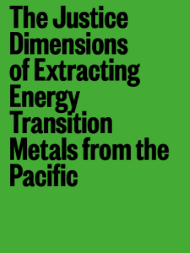The Justice Dimensions of Extracting Energy Transition Metals from the Pacific
Climate change presents the greatest challenge humanity has ever faced: we must rapidly transition to a low-carbon economy and ensure the process does not increase global inequality or injustice as a result. The United Nations calls this a ‘just transition’: a transition process that addresses climate change while respecting the rights of workers and communities and protecting the environment. An oftenoverlooked fact, however, is that decarbonisation will be very mineral intensive because clean energy technologies need more materials than fossil-fuel-based electricity generation technologies. Building low-carbon energy systems to power a low-carbon economy will require vast amounts of ‘energy transition metals’ (ETMs) – like cobalt, copper, and nickel among many others – for new technologies and energy infrastructure.
Publisher: The British Academy
Region: Australia
Type: Report
CITATION
Skrzypek, E., Bainton, N., Lebre, E., & J. Burton. (2022). The Justice Dimensions of Extracting Energy Transition Metals from the Pacific. London: The British Academy.

